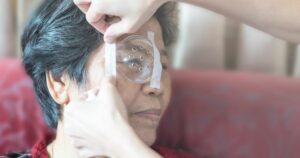If you are a diabetic, there is a good chance that you will develop cataracts. Cataracts are a common complication of diabetes, and they can cause vision problems if left untreated. In this blog post, we will discuss the link between diabetes and cataract. We will also provide information on how to reduce your risk of developing cataracts. Stay tuned for more information!
Contents
How Are Diabetes And Cataract Related?
 Diabetes is a chronic disease that affects the body’s ability to produce insulin. This can lead to high blood sugar levels, which can damage the lens of the eye in time. Cataracts are caused when proteins in the lens of the eye become clumped together and cloudy, impairing vision. People with diabetes are more likely to develop cataracts than those without the condition.
Diabetes is a chronic disease that affects the body’s ability to produce insulin. This can lead to high blood sugar levels, which can damage the lens of the eye in time. Cataracts are caused when proteins in the lens of the eye become clumped together and cloudy, impairing vision. People with diabetes are more likely to develop cataracts than those without the condition.
Research shows that people with diabetes who have high blood sugar levels for longer periods of time are at a higher risk of developing cataracts, even if they don’t have any other health conditions. It is believed that long-term exposure to elevated levels of sugar in the blood can damage proteins in the eye lens, resulting in cloudy vision.
The good news is that with proper management of diabetes and regular eye exams, people with diabetes can reduce their risk of developing cataracts or delay its onset. Eating a healthy diet, exercising regularly, and taking prescribed medications to control blood sugar levels are all important strategies for reducing the risk of developing diabetic cataracts.
What Are The Types Of Cataract In Diabetes?
Diabetic cataracts are caused by the complications of long-term diabetes. The clouding of the eye’s lens can be classified into two main types: posterior subcapsular cataracts (PSC) and cortical cataracts.
Posterior subcapsular cataracts form in the back of the lens, near where the lens attaches to the colored part of your eye known as the iris. This type of diabetic cataract typically appears earlier than other types, resulting in blurred vision, glare and difficulty seeing at night.
Cortical cataracts are characterized by wedge-shaped opacities that form in the lens’ outer edges and grow inward toward the center of the lens. As these cataracts progress, vision becomes increasingly blurry and cloudy, eventually leading to complete blindness if left untreated.
Visit- Online Diabetes Treatment
What Are The Risk Factors For Developing Diabetic Cataracts?
Diabetics who have had the disease for a longer time period, have poor glycemic control, and/or are on certain medications are at an increased risk of developing diabetic cataracts. Other factors include being over 40 years of age, having an eye injury or infection, smoking, and being exposed to bright sunlight for long periods of time.
How Are Diabetic Cataracts Treated?
 Treatment options depend on the severity of the cataract and any other related eye conditions. In some cases, vision can be improved with eyeglasses or contact lenses. If the cataract is severe enough, surgery may be needed to remove it. During the procedure, the surgeon will make a tiny incision in your eye and carefully use an ultrasound probe to break up the cataract before removing it. Following surgery, a new artificial lens will be inserted into the eye.
Treatment options depend on the severity of the cataract and any other related eye conditions. In some cases, vision can be improved with eyeglasses or contact lenses. If the cataract is severe enough, surgery may be needed to remove it. During the procedure, the surgeon will make a tiny incision in your eye and carefully use an ultrasound probe to break up the cataract before removing it. Following surgery, a new artificial lens will be inserted into the eye.
Diabetic cataracts can lead to vision loss if left untreated, so it’s important to be aware of the signs and symptoms and seek treatment promptly. If you have diabetes and notice any changes in your vision or eye health, make an appointment with an ophthalmologist right away. With timely diagnosis and treatment, you can preserve your sight and maintain good eye health.
This article is for informational purposes only and is not meant to substitute professional medical advice. Always seek the advice of your doctor or qualified healthcare provider before starting any new treatment or discontinuing an existing one.
How Long Does It Take To Recover From Cataract Surgery?
The recovery time for cataract surgery varies depending on the type of procedure used and the individual’s overall health. Generally, most people feel better in a few days and can resume normal activities within a week. However, it may take several weeks or months to fully recover and allow your vision to stabilise. The majority of patients regain perfect or near-perfect vision within 2-3 months of surgery.
If you have diabetes, the healing process could take longer. People with diabetes are more likely to develop cataracts at a younger age and experience slower recovery times after cataract surgery due to their disease. As such, it is important for diabetics to be closely monitored during recovery to ensure a successful outcome.
It is also important to note that diabetes can cause complications after cataract surgery, including infection and delayed healing. To reduce the risk of these potential issues, diabetics are typically advised to manage their blood sugar levels before and after cataract surgery.
Preventions To Take Post-Surgery?

After cataract surgery, there are important steps you should take to make sure your eyes stay healthy. It is especially important for those with diabetes to keep their eyes healthy and make sure their blood sugar levels remain under control. Here are some preventive measures that can be taken:
- Follow the advice of your eye doctor closely. This includes attending follow-up appointments and taking any medication prescribed.
- Wear protective eyewear when outside. UV radiation from the sun can cause damage to your eyes, so wearing sunglasses or a hat with a brim is important.
- Make sure to check your blood sugar levels every day and keep them under control.
- Regular eye exams are important to detect any changes in your vision or signs of diabetic retinopathy.
- Eat a healthy diet and exercise regularly, both of which can help prevent diabetes-related complications such as cataracts or glaucoma.
- Quit smoking if you have this habit, as it increases the risk of developing cataracts.
By following these preventive measures, those with diabetes can help protect their eyes from further damage and keep their vision healthy for years to come.
If you have any further questions about diabetes and cataracts, be sure to talk to your doctor or eye care professional for more information.
Conclusion
In conclusion, diabetes and cataract are closely related to one another. People with diabetes are at higher risk of developing cataracts, and those diagnosed with cataracts should be aware that their condition may be linked to diabetes. As a result, all diabetics should take extra precautions when it comes to eye health and contact their diabetes experts if they notice any vision changes or problems.
For surgery, you must always consult with your doctor to determine if surgery is the right option for you. Cataract surgery is a safe and painless procedure. At MantraCare we have a team of experienced eye surgeons, who will be happy to answer your any questions on cataract surgery, Diabetes treatment (Type 1 diabetes treatment, Type 2 diabetes treatment), online diabetologists, and Diabetes clinic franchise. Call us at +91-9711116605 for any inquiries.
